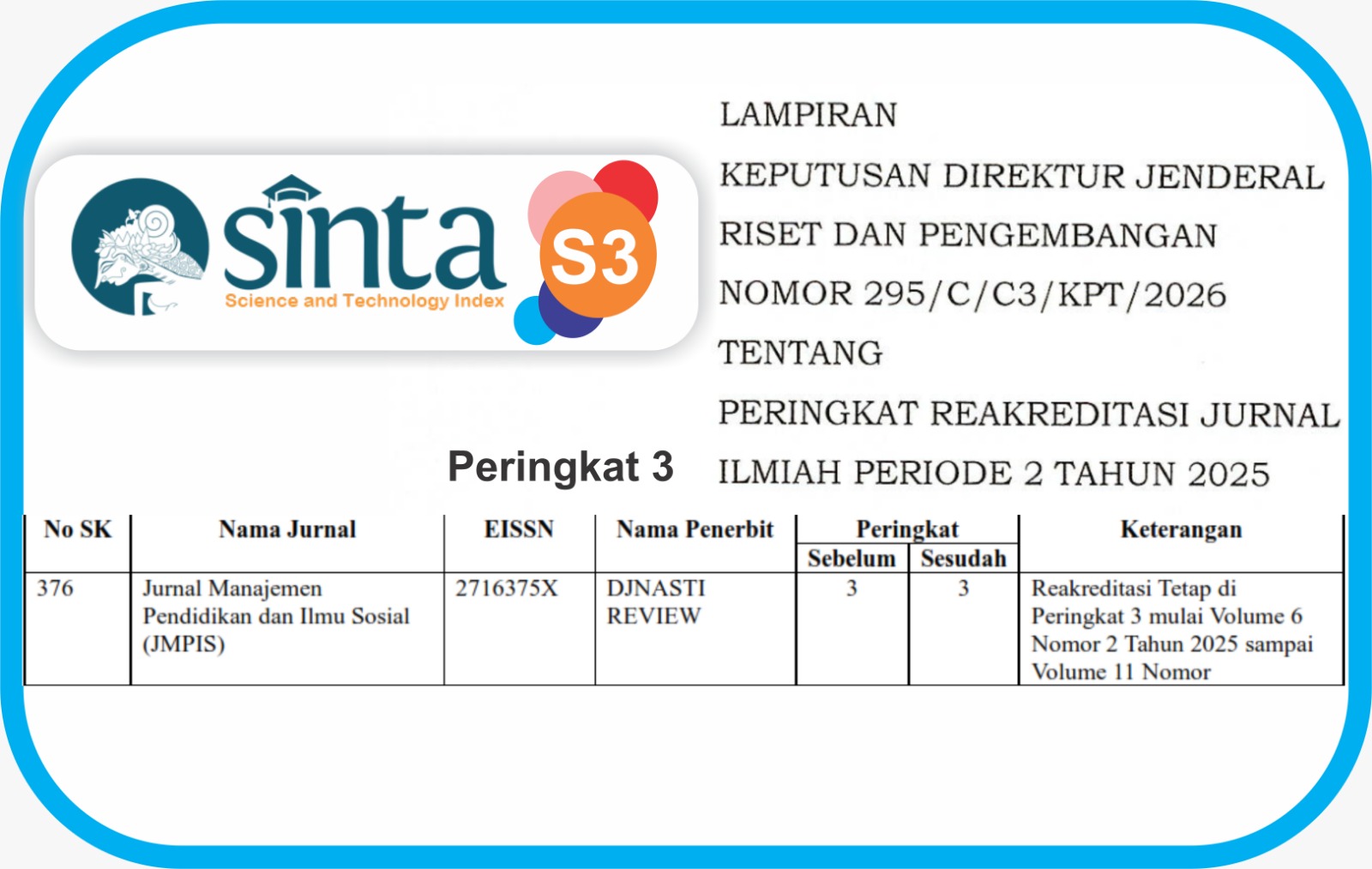Perasaan Melebihi Kualifikasi di Kalangan Karyawan: Systematic Literature Review tentang Anteseden dan Konsekuensi dari Perceived Overqualification dalam Organisasi Asia
DOI:
https://doi.org/10.38035/jmpis.v6i4.4597Keywords:
Overkualifikasi, Perceived Overqualification, Asia, Systematic Literature ReviewAbstract
Di era yang menjunjung pendidikan, fenomena kualifikasi berlebih (perceived overqualification) pada karyawan kerap terjadi di penjuru Asia. Penelitian ini ditujukan untuk meninjau penelitian terdahulu terkait perceived overqualification dalam konteks organisasi bisnis di Asia. Penelitian ini digunakan untuk mengisi kekosongan pada literatur perceived overqualification di Asia dan juga memberikan pemahaman menyeluruh terhadap definisi, teori, anteseden, konsekuensi, dan rekomendasi strategi terkait perceived overqualification di Asia. Penelitian ini menelusuri semua publikasi yang mengkaji perceived overqualification yang diterbitkan dari tahun 2012 -2025. Sebanyak 22 penelitian dari 108 artikel ditemukan dari basis data Scopus. Penelitian ini menemukan bahwa perceived overqualification merupakan ketidakcocokan atau ketidaksesuaian antara pengetahuan, pengalaman, kompetensi, dan tuntutan yang dibutuhkan dalam pekerjaan. Selain itu, temuan penelitian ini juga berhasil menetapkan beberapa faktor yang membentuk perceived overqualification dan dampak perceived overqualification baik positif dan negatif pada Asia.
References
Ballesteros-Leiva, F., St-Onge, S., & Arcand, S. (2024a). Overqualification and Turnover Intention: The Significance of Work-Life Balance for Canadian-Born and Immigrant Employees. Relations Industrielles / Industrial Relations, 78(2). https://doi.org/10.7202/1109480ar
Ballesteros-Leiva, F., St-Onge, S., & Arcand, S. (2024b). Overqualification and Turnover Intention: The Significance of Work-Life Balance for Canadian-Born and Immigrant Employees. Relations Industrielles / Industrial Relations, 78(2). https://doi.org/10.7202/1109480ar
Bernstein, M., & Crosby, F. (1980). An empirical examination of relative deprivation theory. Journal of Experimental Social Psychology, 16(5), 442–456. https://doi.org/10.1016/0022-1031(80)90050-5
Bochoridou, A., & Gkorezis, P. (2024). Perceived overqualification, work-related boredom, and intention to leave: examining the moderating role of high-performance work systems. Personnel Review, 53(5), 1311–1330. https://doi.org/10.1108/PR-07-2022-0474
Chambel, M. J., Carvalho, V. S., Lopes, S., & Cesário, F. (2021). Perceived overqualification and contact center workers’ burnout: are motivations mediators? International Journal of Organizational Analysis, 29(5), 1337–1349. https://doi.org/10.1108/IJOA-08-2020-2372
Cheng, B., Zhou, X., Guo, G., & Yang, K. (2020). Perceived Overqualification and Cyberloafing: A Moderated-Mediation Model Based on Equity Theory. Journal of Business Ethics, 164(3), 565–577. https://doi.org/10.1007/s10551-018-4026-8
Chua, K., & Chun, N. (2016). IN SeArch Of A Better MAtch: QuAlIfIcAtION MISMAtcheS IN DevelOpINg ASIA. www.adb.org
Cui, Z. (2023). Good soldiers or bad apples? Exploring the impact of employee narcissism on constructive and destructive voice. Humanities and Social Sciences Communications, 10(1), 715. https://doi.org/10.1057/s41599-023-02230-8
Dar, N., Ahmad, S., & Rahman, W. (2022). How and when overqualification improves innovative work behaviour: the roles of creative self-confidence and psychological safety. Personnel Review, 51(9), 2461–2481. https://doi.org/10.1108/PR-06-2020-0429
Deng, H., Guan, Y., Wu, C.-H., Erdogan, B., Bauer, T., & Yao, X. (2018a). A Relational Model of Perceived Overqualification: The Moderating Role of Interpersonal Influence on Social Acceptance. Journal of Management, 44(8), 3288–3310. https://doi.org/10.1177/0149206316668237
Deng, H., Guan, Y., Wu, C.-H., Erdogan, B., Bauer, T., & Yao, X. (2018b). A Relational Model of Perceived Overqualification: The Moderating Role of Interpersonal Influence on Social Acceptance. Journal of Management, 44(8), 3288–3310. https://doi.org/10.1177/0149206316668237
Dong, B., Zheng, B., & Wang, Z. (2020). Career Adaptability and Turnover Intention: A Dual?Mediation Model. The Career Development Quarterly, 68(2), 145–157. https://doi.org/10.1002/cdq.12219
Dooley, D., Prause, J., & Ham-Rowbottom, K. A. (2000). Underemployment and Depression: Longitudinal Relationships. Journal of Health and Social Behavior, 41(4), 421. https://doi.org/10.2307/2676295
Erdogan, B., & Bauer, T. N. (2009). Perceived overqualification and its outcomes: The moderating role of empowerment. Journal of Applied Psychology, 94(2), 557–565. https://doi.org/10.1037/a0013528
Erdogan, B., Karakitapo?lu?Aygün, Z., Caughlin, D. E., Bauer, T. N., & Gumusluoglu, L. (2020). Employee overqualification and manager job insecurity: Implications for employee career outcomes. Human Resource Management, 59(6), 555–567. https://doi.org/10.1002/hrm.22012
Feldman, D. (1996). The nature, antecedents and consequences of underemployment. Journal of Management, 22(3), 385–407. https://doi.org/10.1016/S0149-2063(96)90030-6
Goyal, A., Kumar, P., & Shalini. (2024). Quality Education: A Key Component of the United Nations Sustainable Development Goals (SDGs) (pp. 127–151). https://doi.org/10.1007/978-3-031-68427-2_7
Han, G. D. (2019, December 26). 30% of S. Korean graduates overqualified for their current jobs. Hankyoreh.
Johnson, G. J., & Johnson, W. R. (1996). Perceived Overqualification and Psychological Well-Being. The Journal of Social Psychology, 136(4), 435–445. https://doi.org/10.1080/00224545.1996.9714025
Khan, J., Ali, A., Saeed, I., Vega-Muñoz, A., & Contreras-Barraza, N. (2022). Person–Job Misfit: Perceived Overqualification and Counterproductive Work Behavior. Frontiers in Psychology, 13. https://doi.org/10.3389/fpsyg.2022.936900
Khan, J., Saeed, I., Fayaz, M., Zada, M., & Jan, D. (2023). Perceived overqualification? Examining its nexus with cyberloafing and knowledge hiding behaviour: harmonious passion as a moderator. Journal of Knowledge Management, 27(2), 460–484. https://doi.org/10.1108/JKM-09-2021-0700
Khan, J., Saeed, I., Zada, M., Nisar, H. G., Ali, A., & Zada, S. (2023). The positive side of overqualification: examining perceived overqualification linkage with knowledge sharing and career planning. Journal of Knowledge Management, 27(4), 993–1015. https://doi.org/10.1108/JKM-02-2022-0111
Kitchenham, B. (2007). Guidelines for performing Systematic Literature Reviews in Software Engineering. https://www.researchgate.net/publication/302924724
Kristof-brown, A. L., Zimmerman, R. D., & JOHNSON Henry B, E. C. (2005). CONSEQUENCES OF INDIVIDUALS’ FIT AT WORK: A META-ANALYSIS OF PERSON-JOB, PERSON-ORGANIZATION, PERSON-GROUP, AND PERSON-SUPERVISOR FIT. In PERSONNEL PSYCHOLOGY (Vol. 58).
Li, Y., Jin, S., Chen, Q., & Armstrong, S. J. (2024). A work-family enrichment model of perceived overqualification: the moderating role of flexibility human resource practices. International Journal of Contemporary Hospitality Management, 36(6), 1766–1783. https://doi.org/10.1108/IJCHM-11-2022-1371
Lim, M. A., Anabo, I. F., Phan, A. N. Q., Elepaño, M. A., & Kuntamarat, G. (2023). State of Higher Education in Southeast Asia.
Liu, F., Li, J., Lan, J., & Gong, Y. (2024). Linking perceived overqualification to work withdrawal, employee silence, and pro-job unethical behavior in a Chinese context: the mediating roles of shame and anger. Review of Managerial Science, 18(3), 711–737. https://doi.org/10.1007/s11846-023-00619-y
Liu, S., Luksyte, A., Zhou, L., Shi, J., & Wang, M. (2015). Overqualification and counterproductive work behaviors: Examining a moderated mediation model. Journal of Organizational Behavior, 36(2), 250–271. https://doi.org/10.1002/job.1979
Liu, S., & Wang, M. (2012). Perceived Overqualification: A Review and Recommendations for Research and Practice (pp. 1–42). https://doi.org/10.1108/S1479-3555(2012)0000010005
Liu, Z., Huang, Y., Kim, T., & Yang, J. (2024). Perceived overqualification and employee outcomes: The dual pathways and the moderating effects of dual?focused transformational leadership. Human Resource Management, 63(4), 653–671. https://doi.org/10.1002/hrm.22221
Lobene, E. V., Meade, A. W., & Pond, S. B. (2015). Perceived Overqualification: A Multi-Source Investigation of Psychological Predisposition and Contextual Triggers. Journal of Psychology: Interdisciplinary and Applied, 149(7), 684–710. https://doi.org/10.1080/00223980.2014.967654
Ma, B., & Zhang, J. (2022). Are overqualified individuals hiding knowledge: the mediating role of negative emotion state. Journal of Knowledge Management, 26(3), 506–527. https://doi.org/10.1108/JKM-01-2021-0022
Ma, C., Lin, X., Chen, (George) Zhen Xiong, & Wei, W. (2020). Linking perceived overqualification with task performance and proactivity? An examination from self-concept-based perspective. Journal of Business Research, 118, 199–209. https://doi.org/10.1016/j.jbusres.2020.06.041
Mah, S., Huang, C., & Yun, S. (2025). Overqualified Employees’ Actual Turnover: The Role of Growth Dissatisfaction and the Contextual Effects of Age and Pay. Journal of Business and Psychology, 40(2), 419–437. https://doi.org/10.1007/s10869-024-09959-2
Maynard, D. C., Joseph, T. A., & Maynard, A. M. (2006a). Underemployment, job attitudes, and turnover intentions. In Journal of Organizational Behavior (Vol. 27, Issue 4, pp. 509–536). https://doi.org/10.1002/job.389
Maynard, D. C., Joseph, T. A., & Maynard, A. M. (2006b). Underemployment, job attitudes, and turnover intentions. Journal of Organizational Behavior, 27(4), 509–536. https://doi.org/10.1002/job.389
McDonell, S. (2025, January 4). China’s overqualified youth taking jobs as drivers, labourers and film extras. BBC.
Saini, M., Sengupta, E., Singh, M., Singh, H., & Singh, J. (2023). Sustainable Development Goal for Quality Education (SDG 4): A study on SDG 4 to extract the pattern of association among the indicators of SDG 4 employing a genetic algorithm. Education and Information Technologies, 28(2), 2031–2069. https://doi.org/10.1007/s10639-022-11265-4
Sánchez-Cardona, I., Vera, M., Martínez-Lugo, M., Rodríguez-Montalbán, R., & Marrero-Centeno, J. (2020). When the Job Does Not Fit: The Moderating Role of Job Crafting and Meaningful Work in the Relation Between Employees’ Perceived Overqualification and Job Boredom. Journal of Career Assessment, 28(2), 257–276. https://doi.org/10.1177/1069072719857174
Sánchez-Rebull, M.-V., Rudchenko, V., & Martín, J.-C. (2018). The antecedents and consequences of customer satisfaction in tourism: a systematic literature review. Tourism and Hospitality Management, 24(1), 151–183. https://doi.org/10.20867/thm.24.1.3
Santiago Vela, A. (2021). Same Degree, Same Opportunities? Educational and Social Background Effects on Overeducation in Germany. Social Sciences, 10(8), 315. https://doi.org/10.3390/socsci10080315
Schreurs, B., Hamstra, M. R. W., Jawahar, I. M., & Akkermans, J. (2021). Perceived overqualification and counterproductive work behavior: testing the mediating role of relative deprivation and the moderating role of ambition. Personnel Review, 50(3), 1038–1055. https://doi.org/10.1108/PR-05-2019-0237
Seraj, Z. (2024, March 4). Malaysian graduates are overqualified and underpaid, Khazanah Research Institute report reveals. Malaymail.
Sesen, H., & Ertan, S. S. (2020). Perceived overqualification and job crafting: the moderating role of positive psychological capital. Personnel Review, 49(3), 808–824. https://doi.org/10.1108/PR-10-2018-0423
Tranfield, D., Denyer, D., & Smart, P. (2003). Towards a Methodology for Developing Evidence?Informed Management Knowledge by Means of Systematic Review. British Journal of Management, 14(3), 207–222. https://doi.org/10.1111/1467-8551.00375
Uddin, Md. K., Azim, M. T., & Islam, M. R. (2023). Effect of perceived overqualification on work performance: Influence of moderator and mediator. Asia Pacific Management Review, 28(3), 276–286. https://doi.org/10.1016/j.apmrv.2022.10.005
Vergiansyah, I., Supriharyanti, E., & Nadia, F. N. D. (2024). Humble Leadership in Education: A Systematic Review and Future Direction. JMKSP (Jurnal Manajemen, Kepemimpinan, Dan Supervisi Pendidikan), 9(2), 1180–1197. https://doi.org/10.31851/jmksp.v9i2.16422
Vinayak, R., Bhatnagar, J., & Agarwal, M. N. (2021). When and how does perceived overqualification lead to turnover intention? A moderated mediation model. Evidence-Based HRM: A Global Forum for Empirical Scholarship, 9(4), 374–390. https://doi.org/10.1108/EBHRM-09-2020-0123
Wu, Z., Zhou, X., Wang, Q., & Liu, J. (2023). How perceived overqualification influences knowledge hiding from the relational perspective: the moderating role of perceived overqualification differentiation. Journal of Knowledge Management, 27(6), 1720–1739. https://doi.org/10.1108/JKM-04-2022-0286
Yang, W., Guan, Y., Lai, X., She, Z., & Lockwood, A. J. (2015). Career adaptability and perceived overqualification: Testing a dual-path model among Chinese human resource management professionals. Journal of Vocational Behavior, 90, 154–162. https://doi.org/10.1016/j.jvb.2015.08.007
Ye, X., Li, L., & Tan, X. (2017). Organizational support. Employee Relations, 39(7), 918–934. https://doi.org/10.1108/ER-11-2016-0213
Zhang, F., Wang, B., Qian, J., & Parker, S. K. (2021). Job crafting towards strengths and job crafting towards interests in overqualified employees: Different outcomes and boundary effects. Journal of Organizational Behavior, 42(5), 587–603. https://doi.org/10.1002/job.2517
Zhang, M. J., Law, K. S., & Lin, B. (2016). You think you are big fish in a small pond? Perceived overqualification, goal orientations, and proactivity at work. Journal of Organizational Behavior, 37(1), 61–84. https://doi.org/10.1002/job.2024
Zhao, L., Zhao, S., Zeng, H., & Bai, J. (2021). To share or not to share? A moderated mediation model of the relationship between perceived overqualification and knowledge sharing. Baltic Journal of Management, 16(5), 681–698. https://doi.org/10.1108/BJM-01-2021-0006
Downloads
Published
How to Cite
Issue
Section
License
Copyright (c) 2025 Sharen Gracia Amanda

This work is licensed under a Creative Commons Attribution 4.0 International License.
Hak cipta :
Penulis yang mempublikasikan manuskripnya di jurnal ini menyetujui ketentuan berikut:
- Hak cipta pada setiap artikel adalah milik penulis.
- Penulis mengakui bahwa Jurnal Manajemen Pendidikan dan Ilmu Sosial (JMPIS) berhak menjadi yang pertama menerbitkan dengan lisensi Creative Commons Attribution 4.0 International (Attribution 4.0 International CC BY 4.0) .
- Penulis dapat mengirimkan artikel secara terpisah, mengatur distribusi non-eksklusif manuskrip yang telah diterbitkan dalam jurnal ini ke versi lain (misalnya, dikirim ke repositori institusi penulis, publikasi ke dalam buku, dll.), dengan mengakui bahwa manuskrip telah diterbitkan pertama kali di Jurnal Manajemen Pendidikan dan Ilmu Sosial (JMPIS).











































































